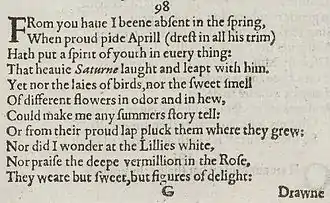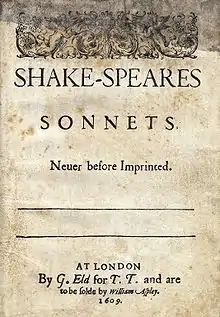Sonnet 98
Sonnet 98 is one of 154 sonnets written by the English playwright and poet William Shakespeare. It's a member of the Fair Youth sequence, in which the persona expresses his love towards a young man. It is the second of a group of three sonnets (97 to 99) to treat a separation of the speaker from his beloved.
| Sonnet 98 | |||||||
|---|---|---|---|---|---|---|---|
 The first eleven lines of Sonnet 98 in the 1609 Quarto | |||||||
| |||||||
Paraphrase
We were apart during the spring, when everything feels young, even aged Saturn; however, none of the beauty I saw around me could bring me into sympathy with my surroundings. I could not admire the lily or the rose, since these were to me only images of you. Thus, it still seemed winter to me, since you were away.
Structure
Sonnet 98 is an English or Shakespearean sonnet. The English sonnet has three quatrains, followed by a final rhyming couplet. It follows the typical rhyme scheme of the form, ABAB CDCD EFEF GG, and is composed in iambic pentameter, a type of poetic metre based on five pairs of metrically weak/strong syllabic positions. The 4th line exemplifies a regular iambic pentameter:
× / × / × / × / × / That heavy Saturn laugh'd and leap'd with him. (98.4)
- / = ictus, a metrically strong syllabic position. × = nonictus.
The 12th line potentially exhibits two metrical variations: first, an initial reversal, second, the rightward movement of the fourth ictus (resulting in a four-position figure, × × / /, sometimes referred to as a minor ionic):
/ × × / × / × × / / Drawn after you, you pattern of all those. (98.12)
The same variations, in the same positions, are also potentially present in line 5. However, if the repetition of the word "nor" draws special emphasis from the reader, both positions would be affected, resulting in the somewhat more regular:
× / × / × / / × × / Yet nor the lays of birds nor the sweet smell (98.5)
The meter demands a few variant pronunciations: line 3's "spirit" is one syllable (possibly pronounced as spear't, sprite, sprit, or spurt[2]), line 6's "different" is two syllables and "flowers" is one.[3]
Source and analysis
As Sidney Lee notes, this poem, like most Renaissance sonnets on similar themes, derives ultimately from Petrarch's sonnet 42; he cites examples from Surrey and Sidney. Edward Dowden notes a resemblance to Spenser's Amoretti 64. G. Wilson Knight connects the rose and lily of this poem to what he sees as a pattern of flower symbolism in the cycle.
Notes
- Pooler, C[harles] Knox, ed. (1918). The Works of Shakespeare: Sonnets. The Arden Shakespeare [1st series]. London: Methuen & Company. OCLC 4770201.
- Booth 2000, p. 262.
- Kerrigan 1995, p. 299.
References
- First edition and facsimile
- Shakespeare, William (1609). Shake-speares Sonnets: Never Before Imprinted. London: Thomas Thorpe.
- Lee, Sidney, ed. (1905). Shakespeares Sonnets: Being a reproduction in facsimile of the first edition. Oxford: Clarendon Press. OCLC 458829162.
- Variorum editions
- Alden, Raymond Macdonald, ed. (1916). The Sonnets of Shakespeare. Boston: Houghton Mifflin Company. OCLC 234756.
- Rollins, Hyder Edward, ed. (1944). A New Variorum Edition of Shakespeare: The Sonnets [2 Volumes]. Philadelphia: J. B. Lippincott & Co. OCLC 6028485.
- Modern critical editions
- Atkins, Carl D., ed. (2007). Shakespeare's Sonnets: With Three Hundred Years of Commentary. Madison: Fairleigh Dickinson University Press. ISBN 978-0-8386-4163-7. OCLC 86090499.
- Booth, Stephen, ed. (2000) [1st ed. 1977]. Shakespeare's Sonnets (Rev. ed.). New Haven: Yale Nota Bene. ISBN 0-300-01959-9. OCLC 2968040.
- Burrow, Colin, ed. (2002). The Complete Sonnets and Poems. The Oxford Shakespeare. Oxford: Oxford University Press. ISBN 978-0192819338. OCLC 48532938.
- Duncan-Jones, Katherine, ed. (2010) [1st ed. 1997]. Shakespeare's Sonnets. The Arden Shakespeare, Third Series (Rev. ed.). London: Bloomsbury. ISBN 978-1-4080-1797-5. OCLC 755065951.
- Evans, G. Blakemore, ed. (1996). The Sonnets. The New Cambridge Shakespeare. Cambridge: Cambridge University Press. ISBN 978-0521294034. OCLC 32272082.
- Kerrigan, John, ed. (1995) [1st ed. 1986]. The Sonnets ; and, A Lover's Complaint. New Penguin Shakespeare (Rev. ed.). Penguin Books. ISBN 0-14-070732-8. OCLC 15018446.
- Mowat, Barbara A.; Werstine, Paul, eds. (2006). Shakespeare's Sonnets & Poems. Folger Shakespeare Library. New York: Washington Square Press. ISBN 978-0743273282. OCLC 64594469.
- Orgel, Stephen, ed. (2001). The Sonnets. The Pelican Shakespeare (Rev. ed.). New York: Penguin Books. ISBN 978-0140714531. OCLC 46683809.
- Vendler, Helen, ed. (1997). The Art of Shakespeare's Sonnets. Cambridge, MA: The Belknap Press of Harvard University Press. ISBN 0-674-63712-7. OCLC 36806589.
.png.webp)
